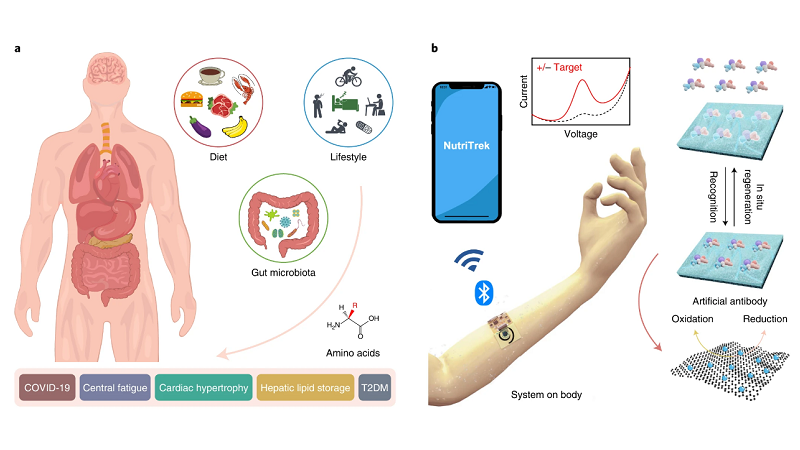Today, we want to highlight an exciting development on the wearable diagnostics front: researchers have developed a wearable device that can monitor nutrients, hormones, and drugs [1].
Real-time health monitoring
The popularity of medical wearables has increased in recent years. A few decades ago, a complex diagnostic machine capable of measuring circulating molecules in the blood would have been a large, intrusive, and bulky affair, but thanks to progress, these systems can be made small and portable. This is largely due to advances in processor technology and the ever smaller sizes in which they can be produced.
These researchers, based in Caltech’s Cherng Department of Medical Engineering, recently revealed this new device. They showed how it could detect even small amounts of nutrients and other molecules in human sweat. These nutrients and molecules can serve as useful biomarkers for determining human health in real time.
The technology behind the sensor was developed in Wei Gao’s lab, which has been developing wearable technology like this for many years. This new more accurate device represents a new pinnacle of his work.
Perhaps the most interesting thing about the new sensor is that it uses molecularly imprinted polymers, which are designed to function as reusable artificial antibodies. This specially formed polymer is combined with a material that can be oxidized or reduced when an electrical voltage is applied when in contact with human sweat.
Finally, the device makes use of microfluidics, which uses many microscopic tubes less than a quarter of a millimeter wide to absorb small volumes of liquid. This allows the sensor to monitor target molecules in sweat even when the amount of fluid available is minuscule.
The device has been tested by human participants in the laboratory with positive results. Dr. Gao hopes to test the device in larger-scale human studies as the next step.
Summary
Noninvasive wearable biosensors for continuous monitoring of metabolites in sweat can detect some analytes at high enough concentrations, typically during vigorous exercise, to generate a sufficient amount of biofluid. Here we report the design and performance of a wearable electrochemical biosensor for the continuous analysis, in sweat during physical exercise and at rest, of trace levels of multiple metabolites and nutrients, including all essential amino acids and vitamins. The biosensor consists of graphene electrodes that can be repeatedly regenerated in situ, functionalized with molecularly imprinted polymers similar to metabolite-specific antibodies and redox-active indicator nanoparticles, and integrated with modules for iontophoresis-based sweat induction, microfluidic sweat sampling, processing of signals and calibration and wireless communication. In volunteers, the biosensor enabled real-time monitoring of amino acid intake and levels during physical exercise, as well as assessment of metabolic syndrome risk (by correlating serum and sweat amino acid levels). Metabolite monitoring for early identification of abnormal health conditions could facilitate applications in precision nutrition.
conclusion
Since the device can potentially measure a wide range of nutrients, metabolites, hormones, and drugs, the utility here is obvious. Being able to monitor biological changes in real time could provide researchers with invaluable information and help inform follow-up studies.
Beyond clinical trials for aging interventions, such technology could also prove popular in the market for wearable public health devices. Imagine being able to monitor your nutrient intake and see how things change in real time. It could also prove invaluable for people with conditions like diabetes, helping them to optimize their glucose levels.
The ability to continuously monitor health biomarkers in real time has almost limitless applications, and this is an exciting advance in biomarker monitoring and diagnostics.
Literature
[1] Wang, M., Yang, Y., Min, J., Song, Y., Tu, J., Mukasa, D., … and Gao, W. (2022). A wearable electrochemical biosensor for monitoring metabolites and nutrients. Nature Biomedical Engineering, 1-11.
.

